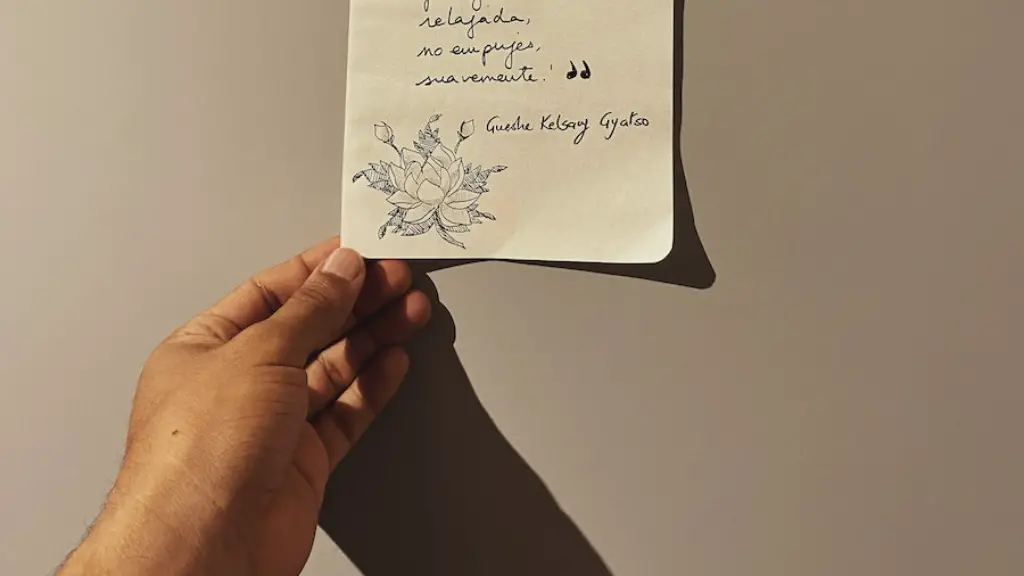Definition of Poetry
For many poets and lovers of poetry, ‘poetry’ is a term that invokes strong emotions and memories. Poetry often triggers a sense of awe, wonder, and admiration. Poetry can be considered as an effortless expression of emotion and thought, a medium through which the artist can express and create something unique and captivating. According to English poet, dramatist, and actor William Hazlitt, poetry is a “passionate expression of thought, emotion, and ideas”. He also said that it is the “most concise and intense embodiment of the poetic art.”
Poetry is often used to communicate ideas, feelings, and experiences. It has been used to express a variety of ideas, from love and joy to heartbreak and tragedy. In its simplest form, poetry is a form of self-expression that allows the poet to express their thoughts, feelings, and ideas in an emotionally-charged way. When reading a poem, readers may be able to connect with and feel something in the poem. This connection can be profound and can provide comfort or inspiration for the reader, as well as for the poet.
Variety of Forms of Poetry
Poetry is a diverse art form, with a wide variety of forms. Some of the most popular forms include free verse, sonnets, haiku, odes, ballads, and epic poetry. To some, these forms represent the classic embodiment of poetry. Each of these forms enables poets to create unique, original works. Free verse, for example, allows poets to write without the restrictions of a rhyme scheme and to let the poem flow freely. Sonnets, on the other hand, use a strict rhyme scheme and structure, which can allow poets to express a more defined idea or emotion.
No matter what form a poet chooses to write in, creativity is encouraged and valued. Creative expression is often seen as the ultimate goal of a poem. Even classic forms of poetry allow for creativity, as poets are encouraged to push the boundaries and create something brand new. Poetry gives poets a way to express themselves and connect with others in a unique, beautiful way.
The Benefits of Writing Poetry
Writing poetry provides numerous benefits for the poet and reader alike. The act of engaging in a creative activity can be beneficial for the mind and for physical health. Writing allows for an emotional release and can be an effective tool for managing depression and stress. In addition, it can help to cultivate creativity and improve mental dexterity.
For the reader, poetry can provide a sense of comfort, wonder, and inspiration. It can open a new door of understanding and connection, and it can broaden perspectives. Poetry can be a tool to convey feelings, ideas, and values in a concise, emotive way. There is a power in poetry that allows readers to explore the depths of the human experience.
Ways to Enjoy Poetry
Poetry can be enjoyed in many different ways. Listening to or reading poetry can provide an immersive experience for the reader. Sharing poetry is also a great way to connect with others, as different poems can evoke different experiences and memories. Attending open mic readings or live poetry events is also a great way to connect with the poetry community.
Writing poetry can also be a great way to explore and express emotions. It can be a beneficial exercise in self-discovery and creativity. If you’re just getting started, it can be helpful to read a variety of poems, to identify one’s own writing style, and to get inspired. Once you’re feeling confident and ready, it’s time to get started on your own poem.
Exploring the Works of Great Poets
To further deepen your knowledge of the art of poetry, it can be helpful to explore the works of great poets. From William Shakespeare to Sylvia Plath, reading poetry from some of the most revered poets can help you to gain a better understanding of different poetic forms and devices. It can also provide insight into the themes and ideas that many poets have used throughout history to express their thoughts, emotions, and values.
Reading and exploring poetry can be a rewarding experience. For the poet, it can provide a means of self-expression and creative exploration. For the reader, it can bring joy, inspiration, and potentially even comfort. Ultimately, poetry is a way to communicate and connect in a unique, emotive way and can open up new doors of understanding and appreciation.
Exploring Poetic Devices
Poets often use a variety of poetic devices to create beautiful and captivating works of art. While there are many different devices, some of the most commonly used include rhyme, alliteration, assonance, repetition, and metaphor. These devices can be used to further emphasize the poem’s emotion or theme. By using poetic devices, poets can craft their works in a way that elicits a response from the reader.
In addition, poets often use grammar, punctuation, and imagery to create works that capture the attention of the reader. For example, poets often employ enjambment, a form of punctuation that signifies a line break that occurs in the middle of a sentence, in order to further emphasize the meaning of a poem. Understanding and exploring the use of poetic devices can be an insightful and rewarding experience.
Finding the Right Voice
Developing one’s own unique voice in poetry is an important aspect of the craft. A poet’s voice is often shaped by the poet’s experiences and passions, and it can be a powerful tool to express one’s own thoughts and feelings. Developing a unique voice involves exploring one’s own identity as a poet and embracing one’s individual experiences. It can be helpful to read the works of other poets to find inspiration and to further hone one’s own voice.
In addition to developing one’s own voice, it is important for aspiring poets to understand their audience and the impact their works will have on them. A poet should be aware of how their works will be received and be prepared to handle any criticism or feedback that comes their way. Ultimately, being mindful of the impact of one’s works on the reader is an important part of the craft.
The Power of Poetry
The power of poetry is undeniable. It has been used to express a variety of emotions and to bring comfort to those in distress. It has enabled people to share their thoughts, feelings, and experiences in a unique, creative way. No matter what form it takes, it can bring joy, awe, and inspiration to both poets and readers alike.
From classic poetic forms to unique, individual styles, poetry can take many forms. It is a powerful, creative art form that will continue to captivate readers, poets, and lovers of literature for years to come. Whether you’re a budding poet or a passionate reader, the power of poetry can bring joy and inspiration to your life.
The Role of Poetry in Educating the Public
The role of poetry in educating the public is often overlooked, but it is incredibly important. Poetry can provide a platform for poets to express their views and opinions on a variety of topics and can shed light on important issues and events. In doing so, it allows readers to gain valuable insight and understanding, and it can be used to inspire and motivate people to take action.
Poetry can also be used to spread awareness of social and environmental issues and to encourage a greater understanding of different subject matters. By exploring a range of topics, poetry can bring people together and create meaningful conversations. Ultimately, poetry has the potential to shape the way we think and can be an invaluable tool for educating the public.
Exploring the Power of Spoken Word Poetry
Spoken word poetry has become increasingly popular in recent years, as it provides an exciting and engaging platform for poets to express themselves. This type of poetry allows poets to not only express their thoughts and feelings in an emotive and captivating way, but also to perform them in a way that can reach a wider audience and create an even more powerful impact. Performing spoken word poetry often requires immense courage and allows poets to connect with the audience in an intimate way.
Attending a slam poetry open mic allows the audience to watch the poets perform their works. It also creates an opportunity for poets to interact and support each other. Ultimately, spoken word poetry has become a compelling and powerful platform to communicate, evoke powerful emotion, and bring people together.
The Effect of Poetry on the Human Mind
The effect of poetry on the human mind can be profound and long-lasting. Reading and writing poetry can evoke a range of emotions, from joy and wonder to despair and sorrow. It can also be used to gain insight and understanding into different topics, to explore human nature and experience, and to appreciate the beauty in the world. In addition, it can help to improve mental dexterity and creativity.
Finally, poetry can provide comfort for those who are struggling and can be a source of great inspiration for those seeking to find joy in the world. Ultimately, poetry is an immensely powerful tool, and its potential to help, to heal, and to connect can never be overstated.





